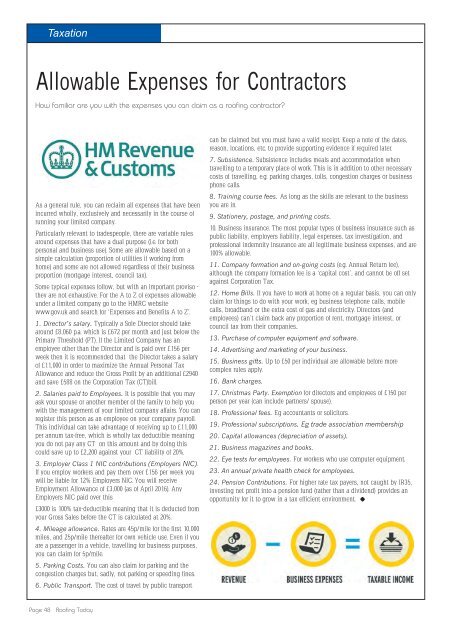Roofing
2daLuWo
2daLuWo
You also want an ePaper? Increase the reach of your titles
YUMPU automatically turns print PDFs into web optimized ePapers that Google loves.
Taxation<br />
Allowable Expenses for Contractors<br />
How familiar are you with the expenses you can claim as a roofing contractor?<br />
As a general rule, you can reclaim all expenses that have been<br />
incurred wholly, exclusively and necessarily in the course of<br />
running your limited company.<br />
Particularly relevant to tradespeople, there are variable rules<br />
around expenses that have a dual purpose (i.e. for both<br />
personal and business use). Some are allowable based on a<br />
simple calculation (proportion of utilities if working from<br />
home) and some are not allowed regardless of their business<br />
proportion (mortgage interest, council tax).<br />
Some typical expenses follow, but with an important proviso -<br />
they are not exhaustive. For the A to Z of expenses allowable<br />
under a limited company go to the HMRC website<br />
www.gov.uk and search for ‘Expenses and Benefits A to Z’.<br />
1. Director’s salary. Typically a Sole Director should take<br />
around £8,060 p.a. which is £672 per month and just below the<br />
Primary Threshold (PT). If the Limited Company has an<br />
employee other than the Director and is paid over £156 per<br />
week then it is recommended that the Director takes a salary<br />
of £11,000 in order to maximize the Annual Personal Tax<br />
Allowance and reduce the Gross Profit by an additional £2940<br />
and save £588 on the Corporation Tax (CT)bill.<br />
2. Salaries paid to Employees. It is possible that you may<br />
ask your spouse or another member of the family to help you<br />
with the management of your limited company affairs. You can<br />
register this person as an employee on your company payroll.<br />
This individual can take advantage of receiving up to £11,000<br />
per annum tax-free, which is wholly tax deductible meaning<br />
you do not pay any CT on this amount and by doing this<br />
could save up to £2,200 against your CT liability of 20%.<br />
3. Employer Class 1 NIC contributions (Employers NIC).<br />
If you employ workers and pay them over £156 per week you<br />
will be liable for 12% Employers NIC. You will receive<br />
Employment Allowance of £3,000 (as of April 2016). Any<br />
Employers NIC paid over this<br />
£3000 is 100% tax-deductible meaning that it is deducted from<br />
your Gross Sales before the CT is calculated at 20%.<br />
4. Mileage allowance. Rates are 45p/mile for the first 10,000<br />
miles, and 25p/mile thereafter for own vehicle use. Even if you<br />
are a passenger in a vehicle, travelling for business purposes,<br />
you can claim for 5p/mile.<br />
5. Parking Costs. You can also claim for parking and the<br />
congestion charges but, sadly, not parking or speeding fines.<br />
6. Public Transport. The cost of travel by public transport<br />
can be claimed but you must have a valid receipt. Keep a note of the dates,<br />
reason, locations, etc. to provide supporting evidence if required later.<br />
7. Subsistence. Subsistence includes meals and accommodation when<br />
travelling to a temporary place of work. This is in addition to other necessary<br />
costs of travelling, e.g. parking charges, tolls, congestion charges or business<br />
phone calls.<br />
8. Training course fees. As long as the skills are relevant to the business<br />
you are in.<br />
9. Stationery, postage, and printing costs.<br />
10. Business insurance. The most popular types of business insurance such as<br />
public liability, employers liability, legal expenses, tax investigation, and<br />
professional indemnity insurance are all legitimate business expenses, and are<br />
100% allowable.<br />
11. Company formation and on-going costs (e.g. Annual Return fee),<br />
although the company formation fee is a ‘capital cost’, and cannot be off set<br />
against Corporation Tax.<br />
12. Home Bills. If you have to work at home on a regular basis, you can only<br />
claim for things to do with your work, eg business telephone calls, mobile<br />
calls, broadband or the extra cost of gas and electricity. Directors (and<br />
employees) can’t claim back any proportion of rent, mortgage interest, or<br />
council tax from their companies..<br />
13. Purchase of computer equipment and software.<br />
14. Advertising and marketing of your business.<br />
15. Business gifts. Up to £50 per individual are allowable before more<br />
complex rules apply.<br />
16. Bank charges.<br />
17. Christmas Party. Exemption for directors and employees of £150 per<br />
person per year (can include partners/ spouse).<br />
18. Professional fees. Eg accountants or solicitors.<br />
19. Professional subscriptions. Eg trade association membership<br />
20. Capital allowances (depreciation of assets).<br />
21. Business magazines and books.<br />
22. Eye tests for employees. For workers who use computer equipment.<br />
23. An annual private health check for employees.<br />
24. Pension Contributions. For higher rate tax payers, not caught by IR35,<br />
investing net profit into a pension fund (rather than a dividend) provides an<br />
opportunity for it to grow in a tax efficient environment.<br />
Enquiry 4<br />
Page 48 <strong>Roofing</strong> Today


